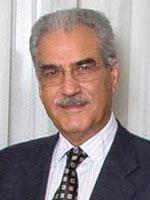This was the third of my quick and furious reactions to the ongoing imprisonment of seven innocent Baha’is in Iran. May of this year marked the end of their seventh year in captivity. As I wrote back then, “I’d never heard of Mr. Khanjani until recently, but today he’s my hero.” He and his six partners in the most benevolent, world-minded sort of “crime” you could imagine were the focus for the international #7Bahais7Years campaign, which was a noble thing but not yet bearing fruit. Now, it’s 7.5 years. Counting…
Here’s one heroic and underreported story of the Quietly Magnificent Seven, prisoners of conscience in Iran.
Mr. Khanjani is 81.
His given name means something like “God’s beauty”.
He was arrested on May 14, 2008, along with five of the Quietly Magnificent Seven. In 2011, his wife of over fifty years, mother of his four children, died. He was not permitted to attend her funeral.
He is held in Gohardasht Prison. (The place even sounds harsh to a Western ear. Tehran’s Evin Prison is more infamous, but Gohardasht is brutally harsh as well.) He lives.
While his story will echo for a long age among Baha’is – among all who pay attention to grace under pressure, to indomitability under the worst circumstances – surely his days are numbered, yet when I read a brief biography, the man does seem to be pretty much unbreakable.
Listen: after the 1979 Revolution, Iran’s Baha’is were still under the leadership of their annually elected National Spiritual Assembly, nine women and men who never asked to be leaders, never campaigned, but were chosen from among the mass of Iran’s largest religious minority to care for and administer the community. It wasn’t long before their death sentences were handed down, the crime being heresy (or espionage, or immorality, or sedition, or any number of euphemisms for cut the head off the snake and the body will follow). All nine were executed.

